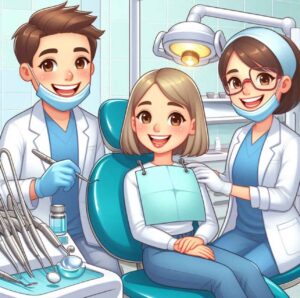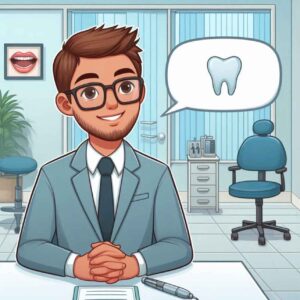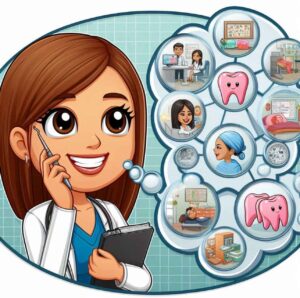Welcome Blessings!
(Tap 🔽 to see more topics!)


That moment in a dental interview can feel like all eyes are on you, right? You’re sitting there, maybe a little nervous, and you know they’re trying to see beyond just your grades. They want to know about you – what makes you tick, why you care about teeth, and if you’re someone they’d trust in their practice or program.
It’s like when a dentist does intricate work; they must be precise, sure, and have a calm and confident approach. That’s what you want to bring to your answers, too – making each count and leaving them with a good feeling about you. Today, we will examine ten big questions frequently arising in dental interviews. But we’re not just going to list them. We’ll discuss why they ask these things, what’s happening in the interviewer’s head, and how you can answer genuinely and professionally!
The question in a dental interview is your opening act. It’s not just chit-chat but it’s your opportunity to make a strong first impression and show them the core of who you are as a future dental professional. How to approach it:
Example Answer:
Having recently completed my studies at (your school), I’ve gained practical experience in restorative procedures and working directly with patients during my internships. What truly drives me is the ability to blend technical skills with genuine patient care. I’m particularly drawn to (mention something specific about the opportunity or the field that excites you). I’m looking forward to contributing to a team that values growth and forward-thinking approaches in dentistry.
Why this question is key:

This question is common because interviewers are trying to understand what drives you and how committed you are to this field. They want to see if this is a genuine passion for you.
How to approach your answer: Think about the specific moments or influences that guided you toward dentistry. It could be:
Example Answer:
For me, the path to dentistry wasn’t a sudden decision but a gradual realization. I’ve always been drawn to the precision of the sciences, and I also appreciate the artistic and hands-on aspects of the profession. However, it truly clicked when I had the opportunity to (say your specific experience, e.g., volunteer at a dental clinic, observe a procedure, have significant dental expertise). Seeing firsthand the impact a dentist can have on someone’s health and self-esteem was incredibly powerful. That’s when I knew I wanted to be part of that.
Why this matters to them:
Interviewers are looking beyond just academic qualifications. They want to know if you truly understand what being a dentist entails and genuinely desire to contribute. They’re trying to gauge your intrinsic motivation.
It’s often said that to know where you’re going, you must know where you are. This question, “What are your greatest strengths and weaknesses?” is a chance to reflect on your professional self, much like a dentist uses diagnostic tools to assess a patient’s oral health.
How to approach it effectively:
1. Highlight relevant strengths. Focus on genuinely valuable qualities in the dental profession.
2. Address a weakness constructively. Be honest, but choose an area where you’ve actively taken steps to improve. Frame it in a way that shows self-awareness and a commitment to growth.
Example Answer:
One of my key strengths is my meticulous approach to tasks. Precision is critical in dentistry, and I take pride in carefully considering every detail. For instance, I always double-check measurements during lab work to avoid errors. In terms of an area for growth, I previously felt challenged by public speaking, which is essential for patient education. To address this, I joined a public speaking workshop and actively sought opportunities to present, significantly increasing my comfort level.
Why this is important:
This question isn’t just about listing positives and negatives. It reveals your capacity for self-reflection and dedication to personal and professional development, essential traits for a successful and evolving dental professional.
Many people feel uneasy, even scared, about going to the dentist. Knowing how to connect with and reassure these patients isn’t just a nice skill but a crucial part of being an effective dental professional. Instead of just saying you’re empathetic, show it with concrete actions. Think about the steps you’d take to make a nervous patient feel more at ease. Consider mentioning things like:
Example Answer:
I recognize that dental anxiety is widespread, and building trust with these patients is my priority. My approach usually starts with really listening to what makes them feel anxious. Then, I focus on clear, straightforward communication about what we will do and why. I also believe in creating a calm and reassuring environment. For instance, during my shadowing experiences, I learned the value of explaining each step before it happens and encouraging patients to let me know if they need a moment. It made a noticeable difference in their comfort levels.
Why this matters to them:
Interviewers are looking for candidates who can handle the emotional aspects of patient care, not just the clinical ones. Your ability to manage anxiety demonstrates empathy, communication skills, and a patient-centered approach.
This is your opportunity to shine by sharing a story demonstrating your problem-solving abilities, dental knowledge in action, and ability to bounce back when things get tricky. Think of it as showing them how you think on your feet and what you’ve learned along the way. But how can we make your answer strong?
Example Answer:
One experience that stands out to me was during my time in the clinic when I had a patient who presented with a very unusual pattern of referred pain, making diagnosis quite difficult. We initially suspected (mention initial thought), but the symptoms didn’t align. I took the initiative to (explain my actions – e.g., review the patient’s history in detail, consult relevant literature, discuss with my supervisor). Through this process, we eventually identified (explain the final diagnosis). My key takeaway was the importance of (mention your learning – e.g., thorough investigation, not jumping to conclusions, the value of differential diagnosis).
Why this question is essential to them:
In this part, interviewers seek evidence that you can handle the inevitable complexities of dental practice with composure and sound judgment. They want to see that you can learn from challenges and aren’t afraid to seek support when needed.

Staying current in dentistry isn’t just about knowing what’s new but about showing commitment to providing the best possible care. When interviewers ask, “How do you stay updated with the latest advancements in dentistry?” they’re trying to gauge your proactive approach to learning and dedication to the field’s progress. To approach this question effectively, follow the following tips:
1. Mention specific resources you use.
2. Explain how you apply this knowledge. Briefly discuss how your learning influences your approach or understanding.
3. Show enthusiasm for learning. Let your genuine interest in advancements shine through.
Example Answer:
I believe continuous learning is crucial in a field as dynamic as dentistry. To stay informed, I regularly read publications like the Journal of the American Dental Association and participate in online webinars focusing on digital dentistry and minimally invasive techniques. I also find value in discussing new research and approaches with colleagues in study groups. This ongoing engagement helps me integrate the latest evidence-based practices into my understanding of patient care and allows me to refine my skills continually.
Why this matters to the interviewer. Demonstrating that you actively seek out and engage with new information signals that you are:
Think about those days when the schedule is packed, yet each patient deserves your full attention. It’s a real balancing act in dentistry. How to approach this:
Example Answer:
Effective prioritization starts with good organization in a busy dental setting. I review patient charts in advance to understand their needs and allocate appropriate time. Clear communication is also key. Ensuring patients understand their appointment schedule and any potential delays helps manage expectations. When the unexpected happens, I focus on remaining adaptable while ensuring that the quality of care isn’t compromised. My experience in clinical rotations taught me the value of proactive planning and strong teamwork in handling a demanding schedule while still providing excellent patient care.
Why this is important to interviewers:
They’re looking to see if you can handle the demands of a busy practice while consistently providing high-quality patient care.
In the world of dentistry, it’s not a one-person show. It is like a well-coordinated team where everyone ensures the patient has a great experience and a healthy outcome. This question helps interviewers determine whether they understand that a dental practice thrives on collaboration and whether they can work effectively with others. Below are some tips to approach it:
Example answer:
Providing the best possible care in dentistry hinges on strong teamwork. From my observations and experiences, a smoothly functioning team where dentists, hygienists, assistants, and administrative staff communicate well and respect each other’s contributions directly translates to better patient care and a more positive atmosphere. For instance, during my (mention a specific experience, like a shadowing opportunity or rotation), I saw how seamless coordination between the dentist and the dental assistant made procedures more efficient and helped the patient feel more comfortable and at ease. Open communication and a shared commitment to the patient’s well-being are the cornerstones of successful teamwork in a dental practice.
When you get a question like this, what the interviewers are trying to figure out are as follows:
Also, you can talk about your general approach to ace this type of question. This might include:
Example Answer:
When faced with an ethical challenge in dentistry, my first step is to ensure transparency with the patient, ensuring they fully understand the situation and all available options. I prioritize the patient’s well-being above all else. If the problem is complex, I won’t hesitate to consult with experienced colleagues or refer to ethical guidelines to ensure I make the most responsible decision. For instance, if a patient insisted on a treatment that I didn’t believe was in their best clinical interest, I would take the time to explain my reasoning and recommend evidence-based alternatives thoroughly. Ultimately, maintaining patient trust and upholding professional integrity are essential to me.
Why does this question matter so much? Because ethics are the bedrock of healthcare. Interviewers want to be confident that you can handle those gray areas responsibly and commit to doing what’s right for your patients.
This question goes beyond just your career dreams. It’s also about understanding if your ambitions align with the direction and opportunities within the dental field and potentially this specific practice.
Example Answer:
Looking ahead five years, I envision myself as a proficient and relied-upon dental team member. I’m committed to continuously honing my clinical abilities and am particularly interested in further developing my skills in areas like restorative dentistry. Ideally, I’d be contributing to a practice that prioritizes staying current with advancements in the field, focuses on providing excellent patient care, and supports the ongoing professional growth of its team members.
Why this matters to the interviewer:

Stepping into a dental interview can feel like a significant moment, and it is! But try to see it as more than just a test of your knowledge. It’s also a chance for them to get to know you – your approach, enthusiasm, and what makes you… you. It’s like when a dentist explains a treatment plan to a patient; you want to be clear about the facts and connect with them, right?
Considering these common questions, you’re preparing to show them your professional side, caring nature, and genuine excitement for your dental career. Practice articulating your thoughts, be yourself, and remember that everyone starts somewhere. You’re on a fantastic path!
Voila! Until next time!
Updated Published Date: May 24, 2025
Originally Published Date: May 20, 2025
Additional References/ Future Readings:
Fernandes, A. L. V. C., Malik, J. B., Ansari, S. R., Murali, S., & Thirupathii, J. (2023). Knowledge, attitude, and practice of dentists in the management of medical emergencies in India: A cross-sectional study. Journal of Oral Biology and Craniofacial Research, 13(6), 758–763. https://doi.org/10.1016/j.jobcr.2023.06.007
Antoniadou, M. (2022). Leadership and managerial skills in dentistry: Characteristics and challenges based on a preliminary case study. Dentistry Journal, 10(8), 146. https://doi.org/10.3390/dj10080146
Appukuttan, D. P. (2016). Strategies to manage patients with dental anxiety and dental phobia: Literature review. Clinical, Cosmetic and Investigational Dentistry, 8, 35–50. https://doi.org/10.2147/CCIDE.S63626
Sheriff, S. O., & Sheriff, D. S. (2011). Ethical dilemmas in dentistry. Nigerian Medical Journal, 52(4), 205–206. https://doi.org/10.4103/0300-1652.93788